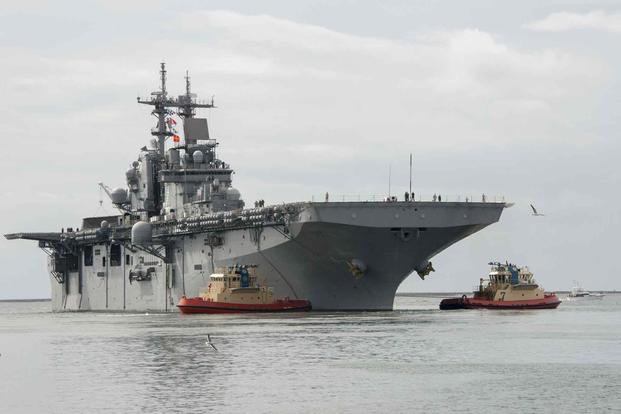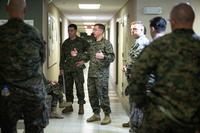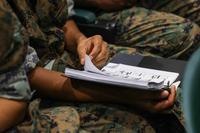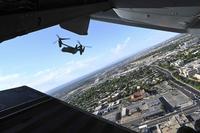A group of House lawmakers is demanding answers and accountability from the Navy in the wake of an exclusive Military.com report that found that the USS Boxer sickened its own crew by intentionally dumping fuel into the ocean.
In a Wednesday letter obtained by Military.com, four House members of the California delegation and a senior member of the Armed Services Committee asked Navy Secretary Carlos Del Toro to "hold accountable those responsible for this incident." They also urged Del Toro to brief Congress on the Navy response to the contamination incident in 2016.
Military.com used interviews with key personnel who were on the ship at the time of the incident, as well as documents obtained from sources and the Navy, to piece together the story in June of how sailors on the Boxer chose to dump the fuel, how it contaminated the ship's water supply, and the health impacts on the crew. Following the story's release, veterans groups also began calling for answers.
Read Next: Iraq Vet Stole Humvee Before Smashing it into Building at Fort Stewart, Prosecutors Say
"It is critical that we learn from this incident to prevent similar situations from happening again," the lawmakers wrote in the letter to the Navy.
While on a deployment in 2016, sailors in the USS Boxer's engineering department were ordered to dump fuel into the ocean by a senior enlisted sailor. Sailors who served on the ship said that, while the procedure is not uncommon, it requires the ship to keep moving to prevent sucking contaminated water into the drinking water system.
However, in this case, the exact opposite happened: The ship stopped, causing the crew's water to become tainted, according to sailors who were aboard the ship and documents from that time. Following the Military.com reporting, the Navy publicly admitted for the first time that the contamination occurred.
The ship was not ready to deal with the massive contamination that ensued. Rations of bottled water quickly ran out. Crew members were told that if they wanted drinking water, they could buy it from the ship's store but soon that ran out too.
Meanwhile, sailors and Marines were told by the ship's top doctor that the water was safe and, eventually, they had no choice but to drink, bathe and cook with it.
The letter is signed by California Reps. Sara Jacobs, Mike Levin, Scott Peters and Juan Vargas, as well as Rep. Joe Courtney, D-Conn., the ranking member on the Armed Services' seapower and projection forces panel. The lawmakers demanded that the Navy provide details on the contamination -- as well as answer why it took the service seven years to publicly acknowledge the contamination.
The Messenger was the first outlet to report on the letter.
A spokesperson for Del Toro said that they "look forward to responding to and working with our partners in Congress on this matter."
The Boxer contamination is not an isolated incident. Last fall, the Navy acknowledged that it had had two recent instances of water contamination aboard aircraft carriers.
One, aboard the USS Nimitz, involved jet fuel -- often referred to by its official designation, JP-5 -- getting into the water supply after the crew tried to clean a water tank that they didn't realize contained the substance. The other involved bacteria in the water system aboard the carrier Abraham Lincoln.
However, in both instances, the admissions came after sailors posted details and images of the contamination on social media.
The contamination on the Boxer lingered for months until the ship was able to pull into Dubai and fully flush and clean the entire drinking water system. However, years later, service members from that deployment told Military.com they are experiencing health problems that range from skin and eye issues to infertility.
In addition to demanding answers on how the incident was allowed to happen in the first place, the lawmakers say they want to know what steps the Navy is taking to prevent similar contamination in the future, and whether the service is working with the Department of Veterans Affairs to help address the disability claims of those affected.
"We have a responsibility to protect the health and quality of life of our service members, so it is vital that we prioritize their well-being, offering comprehensive and high-quality health care, as proof of our commitment to their service," the five lawmakers wrote.
There is a significant amount of uncertainty surrounding the actual effects of diesel ingestion or inhalation on the body. As a result, many of the sailors and Marines on the Boxer who spoke to Military.com have been left wondering whether the 2016 incident is connected to any health issues they are now experiencing.
Military.com is not aware of any disciplinary action taken against any of the leaders on the Boxer connected to the incident.
The ship's commander, Capt. Michael Ruth, has since retired from the Navy. The senior enlisted sailor who ordered the fuel be dumped was later selected to become a chief warrant officer, but he too has retired from the service.
Other officers, like the ship's chief engineer and senior medical officer, appear to still be in the Navy.
"Incidents such as the one on the USS Boxer not only endanger the lives of our sailors and Marines but also risk undermining the trust of current and potential future service members, consequently jeopardizing our recruitment and retention efforts," the lawmakers wrote.
-- Rebecca Kheel contributed to this report.
-- Konstantin Toropin can be reached at konstantin.toropin@military.com. Follow him on Twitter @ktoropin.
Related: Poisoned Water: How a Navy Ship Dumped Fuel and Sickened Its Own Crew












